|
|
|
Sort Order |
|
|
|
Items / Page
|
|
|
|
|
|
|
| Srl | Item |
| 1 |
ID:
169919
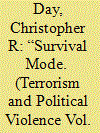

|
|
|
|
|
| Summary/Abstract |
To date, scholarly work on armed groups has seldom considered the notion of rebel resilience, or the factors that enable these groups to survive despite time, military pressure, and the myriad contingent events of civil war. In an effort to develop an explanatory framework for resilience as a distinct outcome of civil war and rebellion, this article examines the conditions under which the Lord’s Resistance Army (LRA) has persisted for nearly three decades. Based on fieldwork and original research, the article explains the LRA’s resilience in light of the group’s organizational structure and resource self-sufficiency, which have been well suited for the borderlands of East and Central Africa. The LRA is a key case of rebel resilience. It is important because it sheds light on the organizational foundations of armed groups, the relationship between resources and rebellion, and the broader study of conflict duration and termination. Understanding the sources of the LRA’s resilience can inform efforts to end such insurgencies.
|
|
|
|
|
|
|
|
|
|
|
|
|
|
|
|
| 2 |
ID:
109932
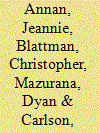

|
|
|
|
|
| Publication |
2011.
|
| Summary/Abstract |
What are the impacts of war on the participants, and do they vary by gender? Are ex-combatants damaged pariahs who threaten social stability, as some fear? Existing theory and evidence are both inconclusive and focused on males. New data and a tragic natural quasi-experiment in Uganda allow us to estimate the impacts of war on both genders, and assess how war experiences affect reintegration success. As expected, violence drives social and psychological problems, especially among females. Unexpectedly, however, most women returning from armed groups reintegrate socially and are resilient. Partly for this reason, postconflict hostility is low. Theories that war conditions youth into violence find little support. Finally, the findings confirm a human capital view of recruitment: economic gaps are driven by time away from civilian education and labor markets. Unlike males, however, females have few civilian opportunities and so they see little adverse economic impact of recruitment.
|
|
|
|
|
|
|
|
|
|
|
|
|
|
|
|
| 3 |
ID:
132354
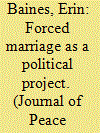

|
|
|
|
|
| Publication |
2014.
|
| Summary/Abstract |
One of the most vexing contradictions about the Uganda originated rebel group, the Lord's Resistance Army (LRA), is the fact that it institutionalized forced marriage on the one hand, while actively discouraging sexually immoral behavior on the other: rape, sexual violence, and promiscuity both within the group and outside it were punishable by severe beating or death. What explains this contradiction? The article suggests that in addition to maintaining discipline and control over a diverse and reluctant group, forced marriage and the regulation of sexual relations reproduced a political project of imagining a 'new Acholi' nation. The article draws on original data collected in focus group discussions with former commanders and wives to commanders to discuss the historical evolution of this vision, how the LRA enforced rules regarding sexual behavior, and finally, the way forced marriage implicated women and girls in the organization of power and domination in the group until it was forced from permanent bases in Sudan in 2002.
|
|
|
|
|
|
|
|
|
|
|
|
|
|
|
|
| 4 |
ID:
104058
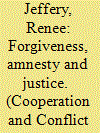

|
|
|
|
|
| Publication |
2011.
|
| Summary/Abstract |
The practice of forgiveness in processes of conflict resolution and post-conflict justice is confronted by two sets of serious criticisms. First, scholars and practitioners alike have questioned whether or not the fundamentally interpersonal practice of forgiveness can be readily and legitimately transposed to broader socio-political contexts. Second, questions have also been raised concerning the potential for forgiveness, particularly when associated with amnesties, to jeopardize and even circumvent the application of justice in post-conflict contexts. By contrast, supporters argue that forgiveness is not only possible but necessary in politics and, by drawing a distinction between amnesties and forgiveness, and restorative and retributive forms of justice, that forgiveness contributes to the achievement of restorative justice. By analysing the role that forgiveness is playing in bringing almost two decades of conflict between the Lord's Resistance Army and the Ugandan government to an end, this article demonstrates that a disjuncture exists between the theoretical treatment of forgiveness and the practice of political forgiveness. That is, it demonstrates, contrary to arguments made by both its supporters and critics, that political forgiveness, even when conceived in conjunction with amnesties, may contribute to both restorative and retributive forms of justice.
|
|
|
|
|
|
|
|
|
|
|
|
|
|
|
|
| 5 |
ID:
192069
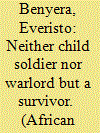

|
|
|
|
|
| Summary/Abstract |
The complications presented to international criminal justice in general and to the International Criminal Court (ICC) in particular by individuals who at one time were victims such as those abducted as ‘child soldiers’ who later became Warlords, deserve to be revisted and unpacked. One such character is Dominic Ongwen who is a typical example of both a victim and a perpetrator of gross violations of human rights, war crimes and genocide. The purpose of this article is six-fold. First, to explore the intersection between political and war criminality. Second, to unpack Ongwen’s conviction and its implications for various stakeholders. Third, I expand on the role of spirituality in shaping the behaviour of combatants and military strategy. Fourth, I diagnose the futility of the ICC’s ‘distant justice’ which operates by ‘exporting criminality’ and ‘importing justice’. Fifth, I propose how to turn Ongwen from an international criminal justice liability into an asset. Lastly, I conclude by proposing a rethinking of international criminal justice by embracing ‘survivors’ justice’ at the ICC. This way, both perpetrators and victims (survivours) can be rehumanised.
|
|
|
|
|
|
|
|
|
|
|
|
|
|
|
|
| 6 |
ID:
188425
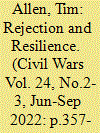

|
|
|
|
|
| Summary/Abstract |
This article focuses on young people who returned from the Lord’s Resistance Army in northern Uganda, mostly as children, over ten years ago. They are, by definition, resilient, because they have survived, but there are important variations. For the most part, those who managed to gain status in the LRA, are those most likely to present themselves as ‘resilient’ according to notions of self-reliance and entrepreneurialism. The majority are not in this position. They are mainly living in rural locations, and commonly face social rejection and extreme poverty. Supporting normative models of resilience has exacerbated deprivation of the most vulnerable.
|
|
|
|
|
|
|
|
|
|
|
|
|
|
|
|
|
|
|
|
|